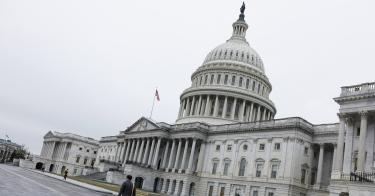The House of Representatives in the new 118th Congress is off to a good start. In adopting a set of innovative rules governing its parliamentary deliberations, the new House Republican majority has authorized the creation of a Select Subcommittee on the Coronavirus Pandemic with broad jurisdiction.
After three years, and more than 1 million deaths in the U.S. associated with COVID-19, a comprehensive, sober, and detailed investigation into the federal government’s response is a necessary precondition for restoring Americans’ trust in federal public health agencies.
Specifically, that includes the Centers for Disease Control and Prevention, the National Institutes of Health, the Food and Drug Administration, and the Office of the Secretary at the Department of Health and Human Services.
A Heritage Foundation analysis of the federal public health performance identified 13 pandemic-related topics that deserve detailed congressional inquiry. (The Daily Signal is the news outlet of The Heritage Foundation.)
Narrow partisanship has no place here. Several of these key problem areas span the presidential administrations of both Donald Trump, a Republican, and Joe Biden, a Democrat.
The first order of business is, and should be, a deep dive into the origins of the novel coronavirus and any American taxpayer funding that may have contributed, perhaps inadvertently, to its evolution.
Given Communist China’s stubborn noncooperation, answering the question of how, exactly, the virus developed is an enormous challenge. Congressional work by the minority staff in the House and Senate has already helped to lay the groundwork for future probing.
In conducting such a probe, congressional investigators should be prepared to summon credible Chinese defectors and enlist the crucial assistance of scientists who specialize in the field of evolutionary virology.
Beyond that challenging task, Congress should, among other things, get some clear answers from the relevant federal officials on several other key questions. For example:
- Why did the CDC, despite statutory requirements dating back to 2006, fail to modernize and upgrade its systems of data collection and dissemination? Dr. Deborah Birx, former coordinator of the White House Coronavirus Task Force under Trump, has already told Congress that “the No.1 public health issue in the United States today is that there is no comprehensive database or integration of data from laboratories, public health institutions, and clinics.”
- Why did federal public health authorities send out confusing messaging on the value of masks and mask mandates? Dr. Anthony Fauci and Dr. Nancy Messonnier of the CDC and then-Surgeon General Jerome Adams initially insisted, very publicly and sometimes vehemently, that masking was unnecessary or ineffective. Previous studies on masking indeed failed to provide strong support for cloth masking, let alone mask mandates. Between February and April 2020, however, top federal officials did a U-turn, and insisted on the value of a masking policy that they previously opposed. What was the new scientific evidence, then available in the professional literature, for such a dramatic policy reversal in that brief period? Congress should find out.
- Why did federal officials attempt to impose a set of unprecedented vaccine mandates on tens of millions of Americans without weighing the risks and benefits of vaccination for different cohorts of the population, based on age, the acquisition of natural immunity, or an underlying vulnerability to the virus? Young and healthy persons faced little danger of severe illness or death from COVID-19. Robust findings in the professional literature demonstrated the strength of natural immunity. Recent research on vaccine boosters for young adults concludes that potential harms outweigh the benefits of the vaccination.
Answers to these questions are just the tip of the iceberg that the subcommittee must get to the bottom of. The Heritage analysis catalogues and documents other key topics and questions that must be pursued.
For example, at the outset of the national medical emergency, federal officials botched diagnostic testing to assess the extent of the contagion; coordination among federal agencies was poor; the Strategic National Stockpile of medical equipment and supplies was deficient; federal recommendations for school closures and business lockdowns entailed enormous costs in lost learning, economic disruption, and damage to mental and physical health; and federal officials sought to disparage or suppress scientific dissent, an unprofessional intolerance utterly incompatible with rigorous scientific inquiry.
Americans are understandably angry at the lack of accountability over the botched COVID-19 response. It is time for a congressional investigatory agenda that holds officials accountable and makes the proper policy changes to protect and restore public trust.
This piece originally appeared in The Daily Signal




